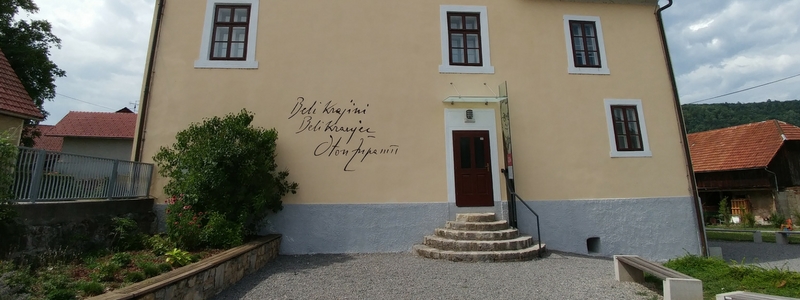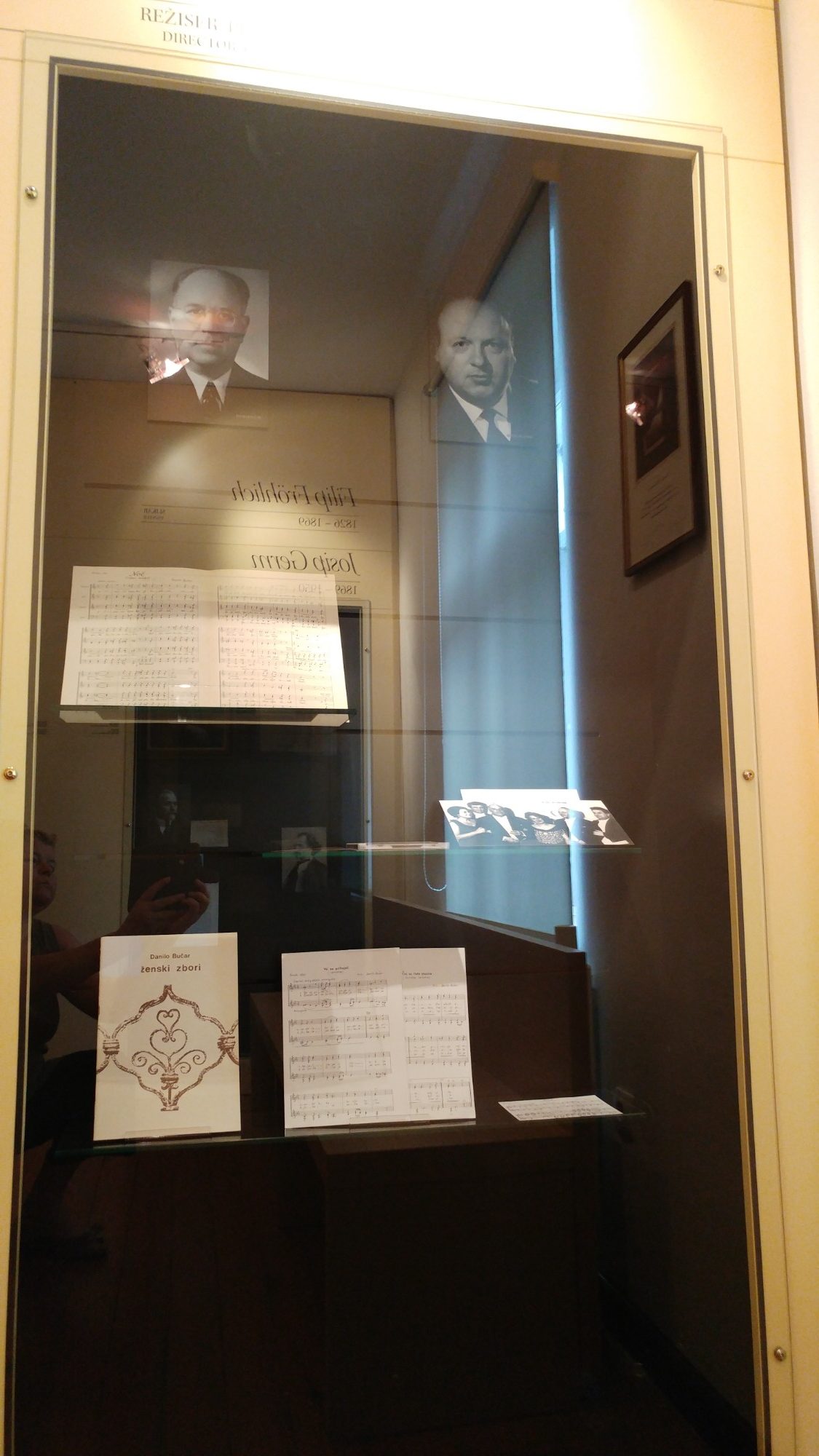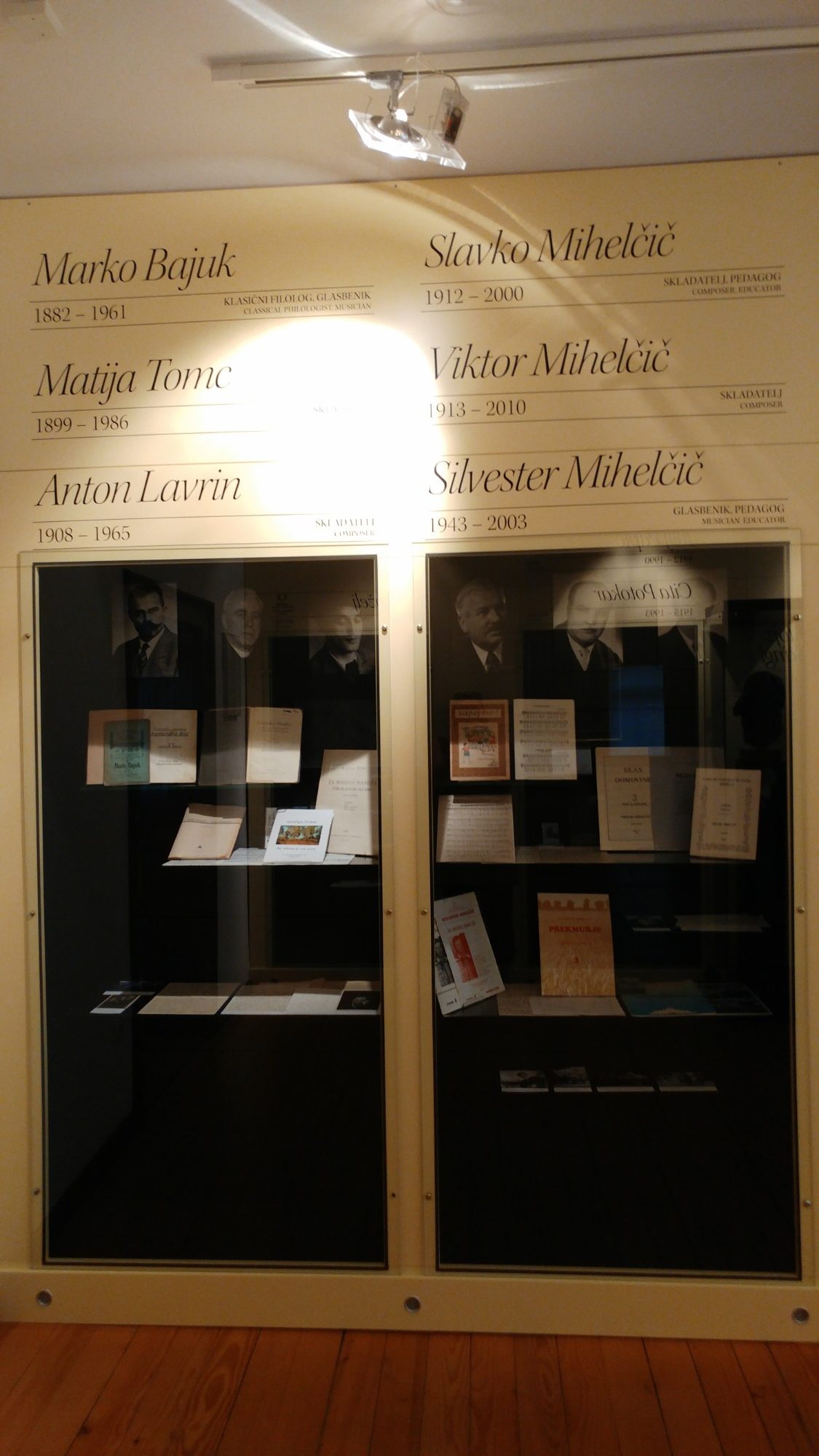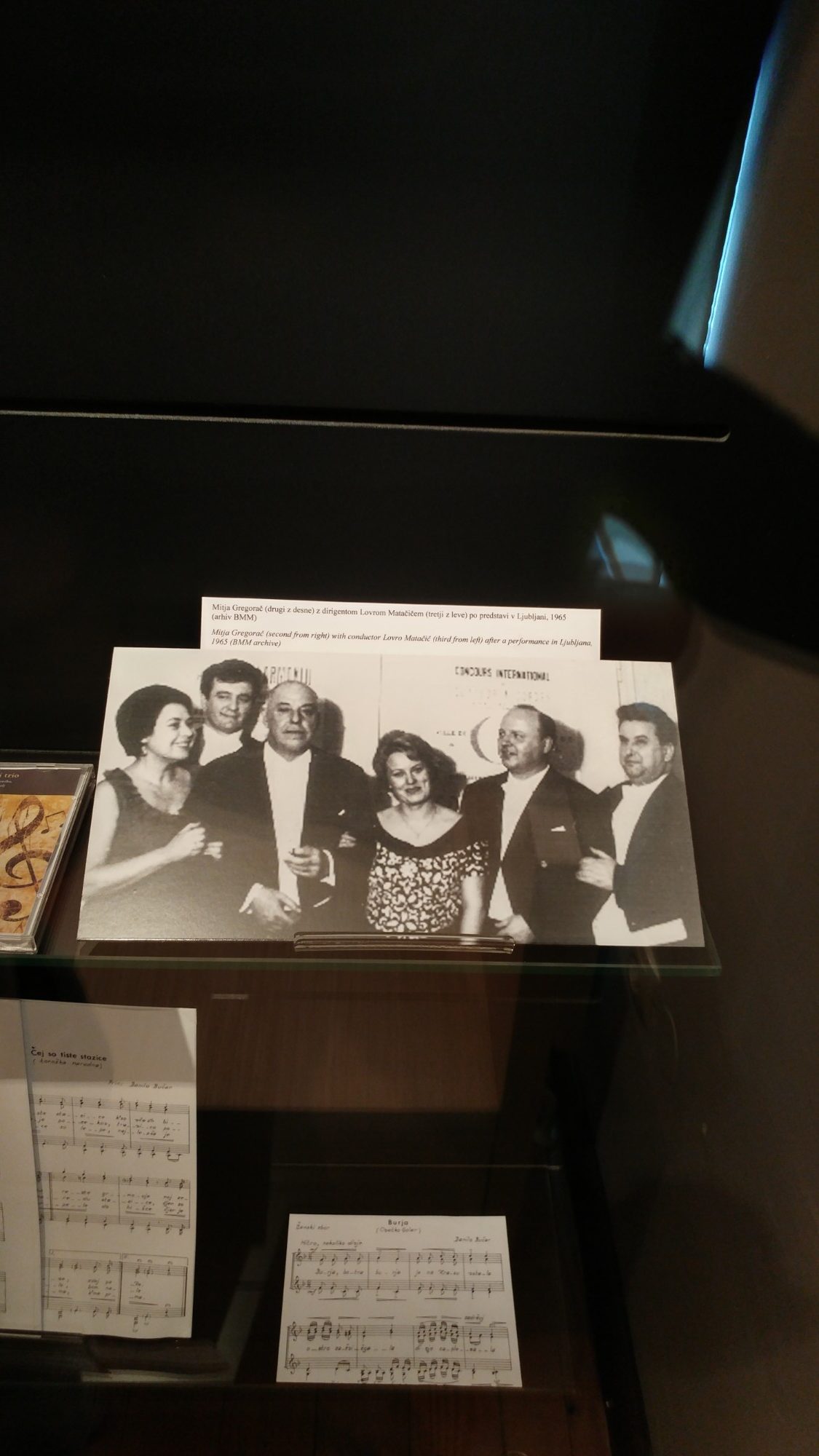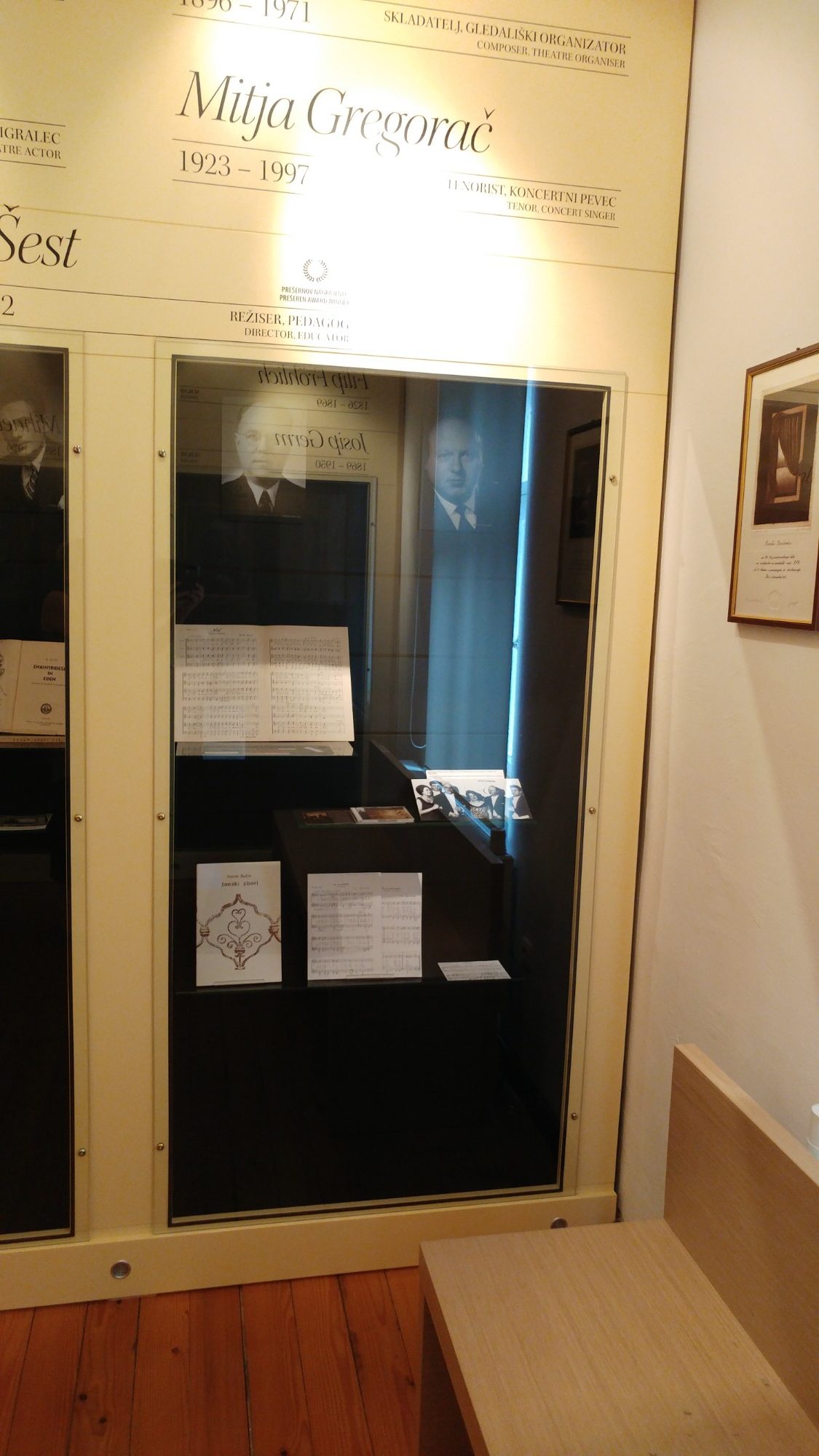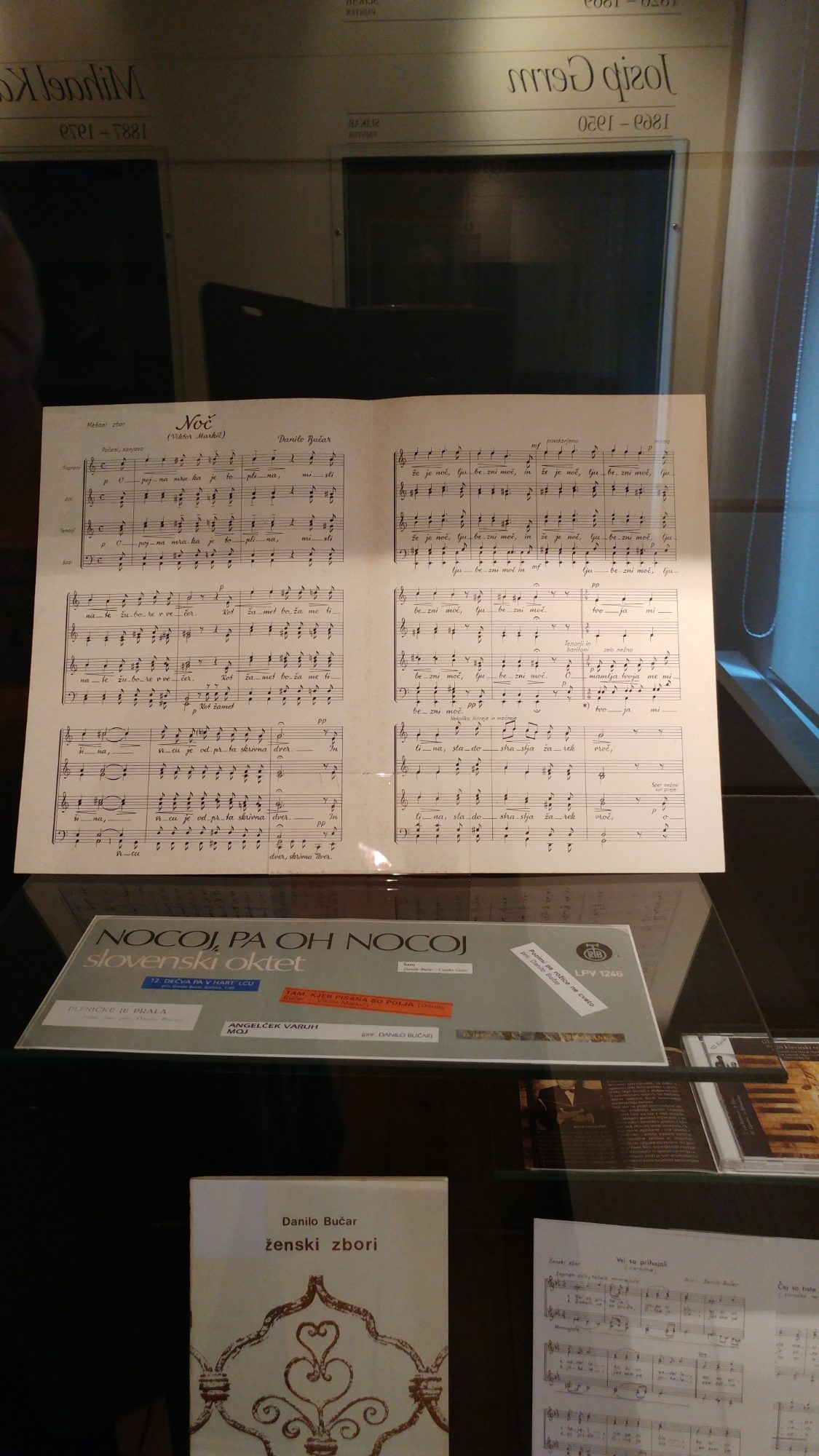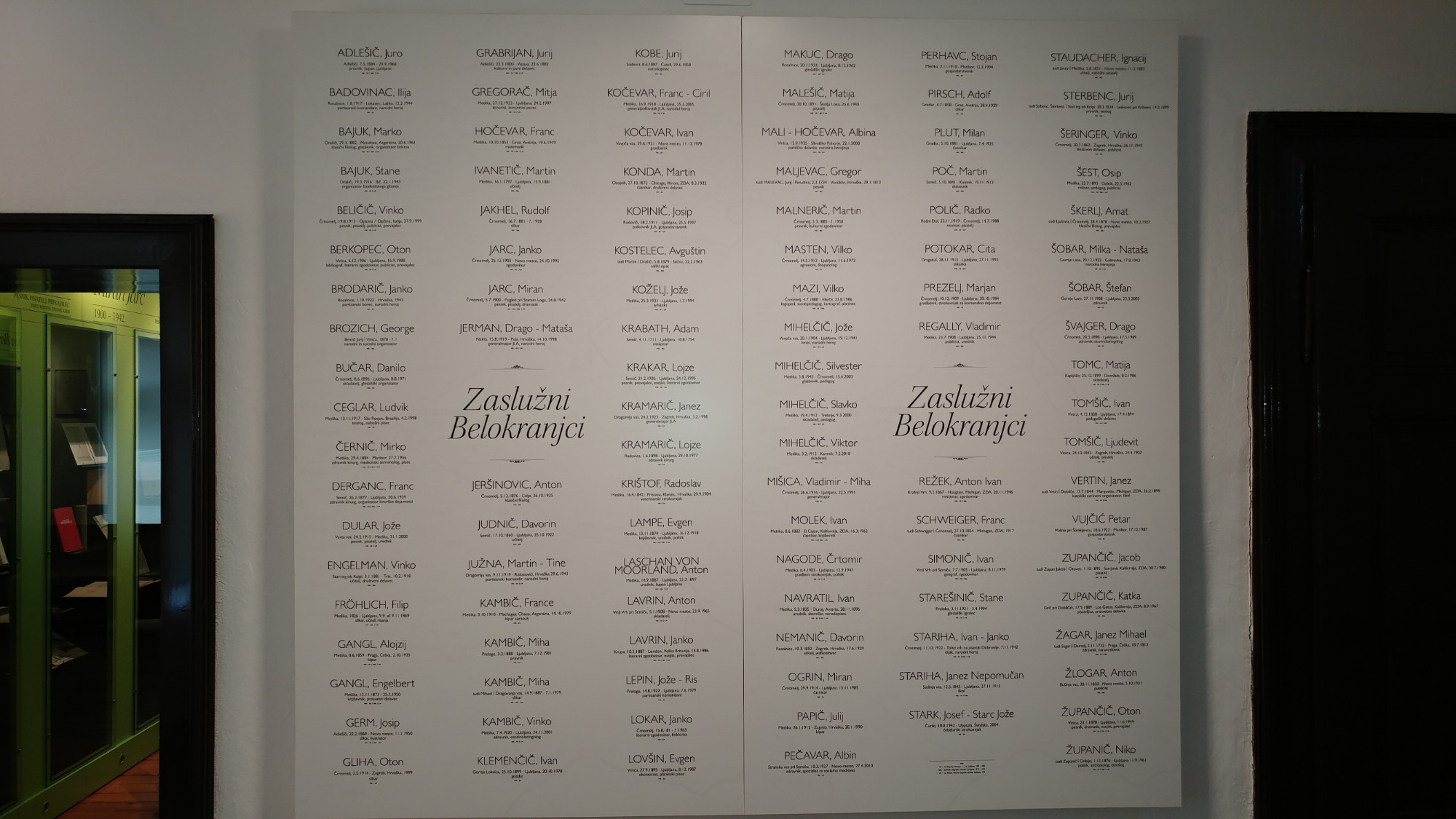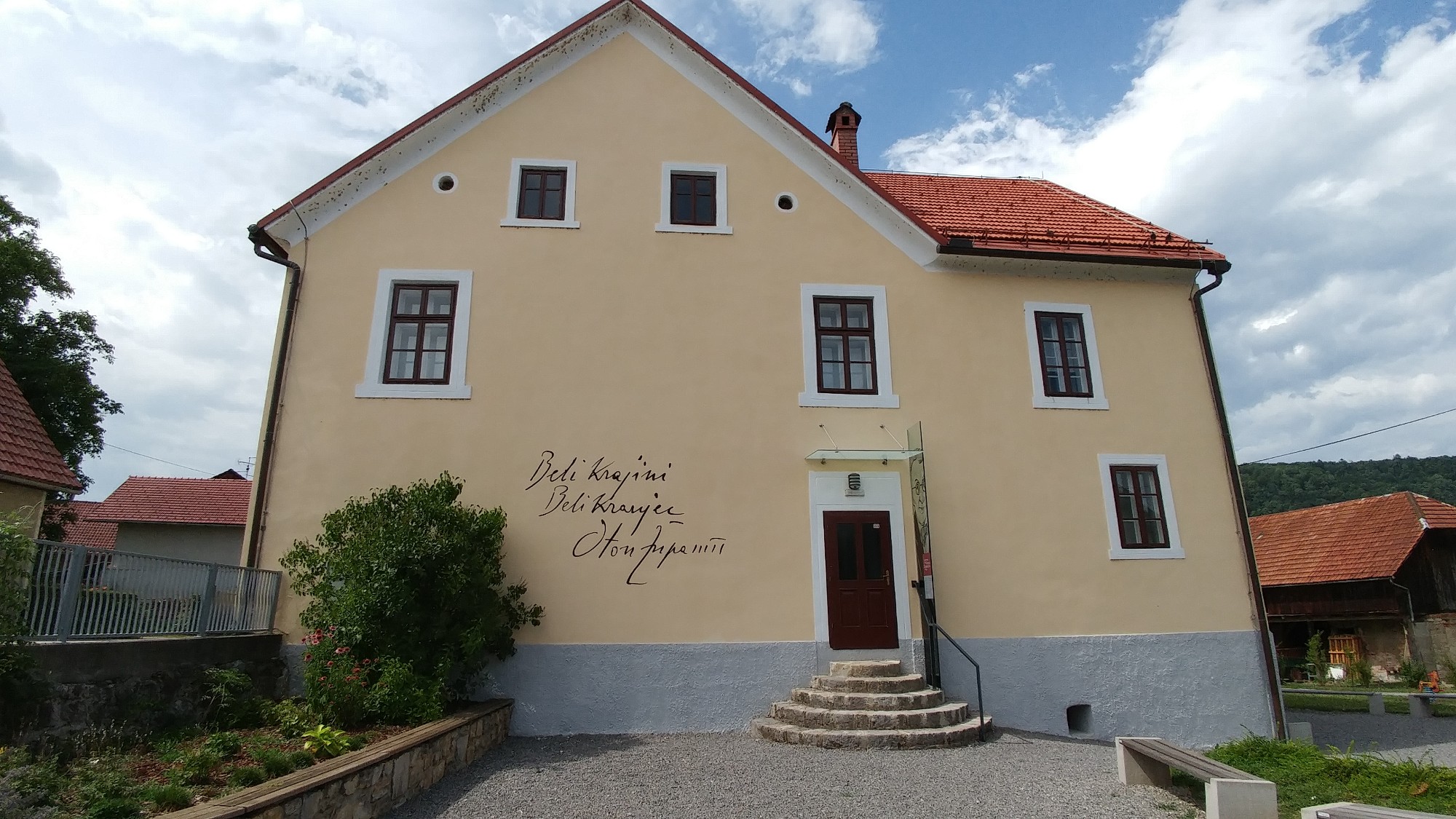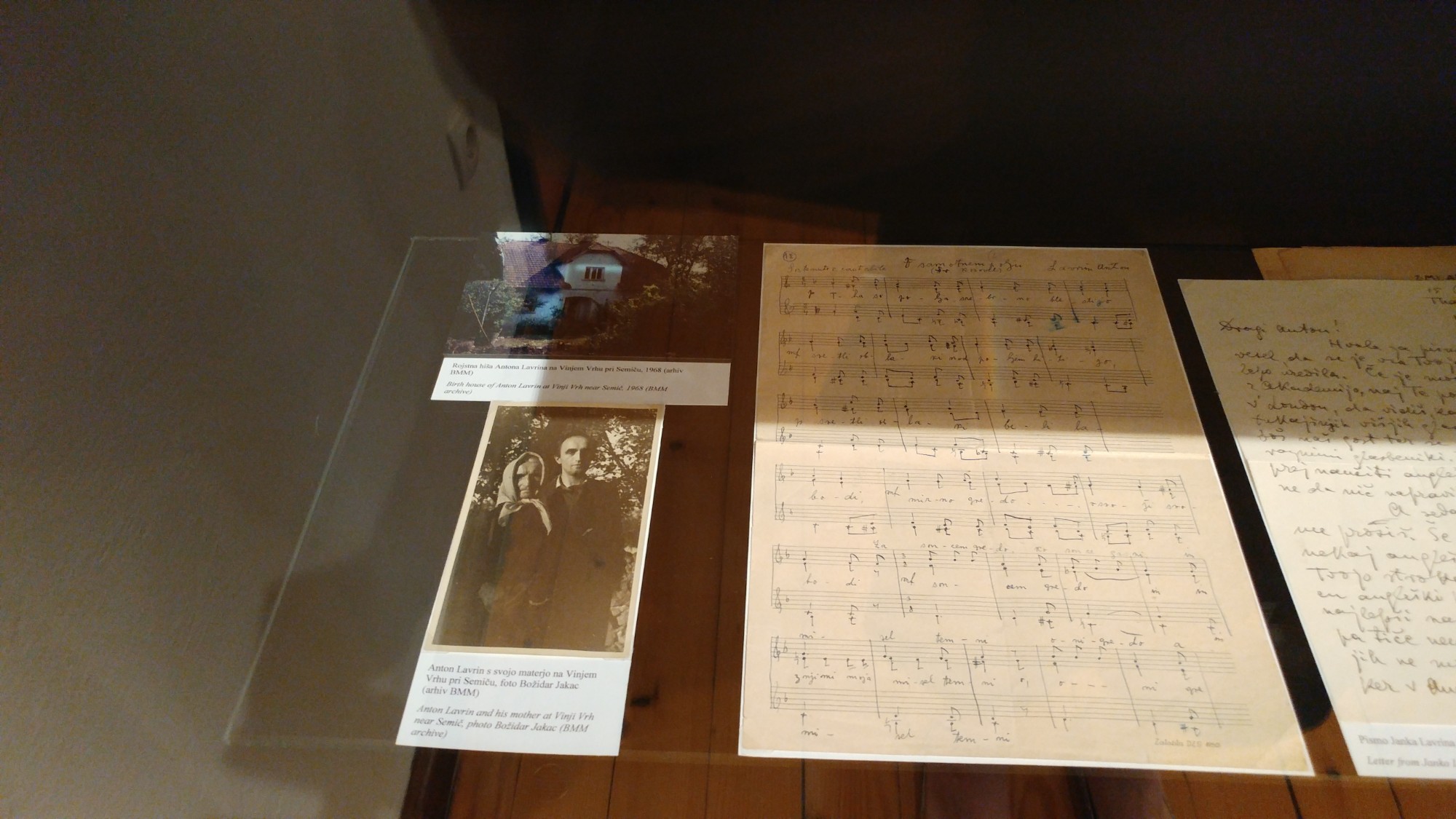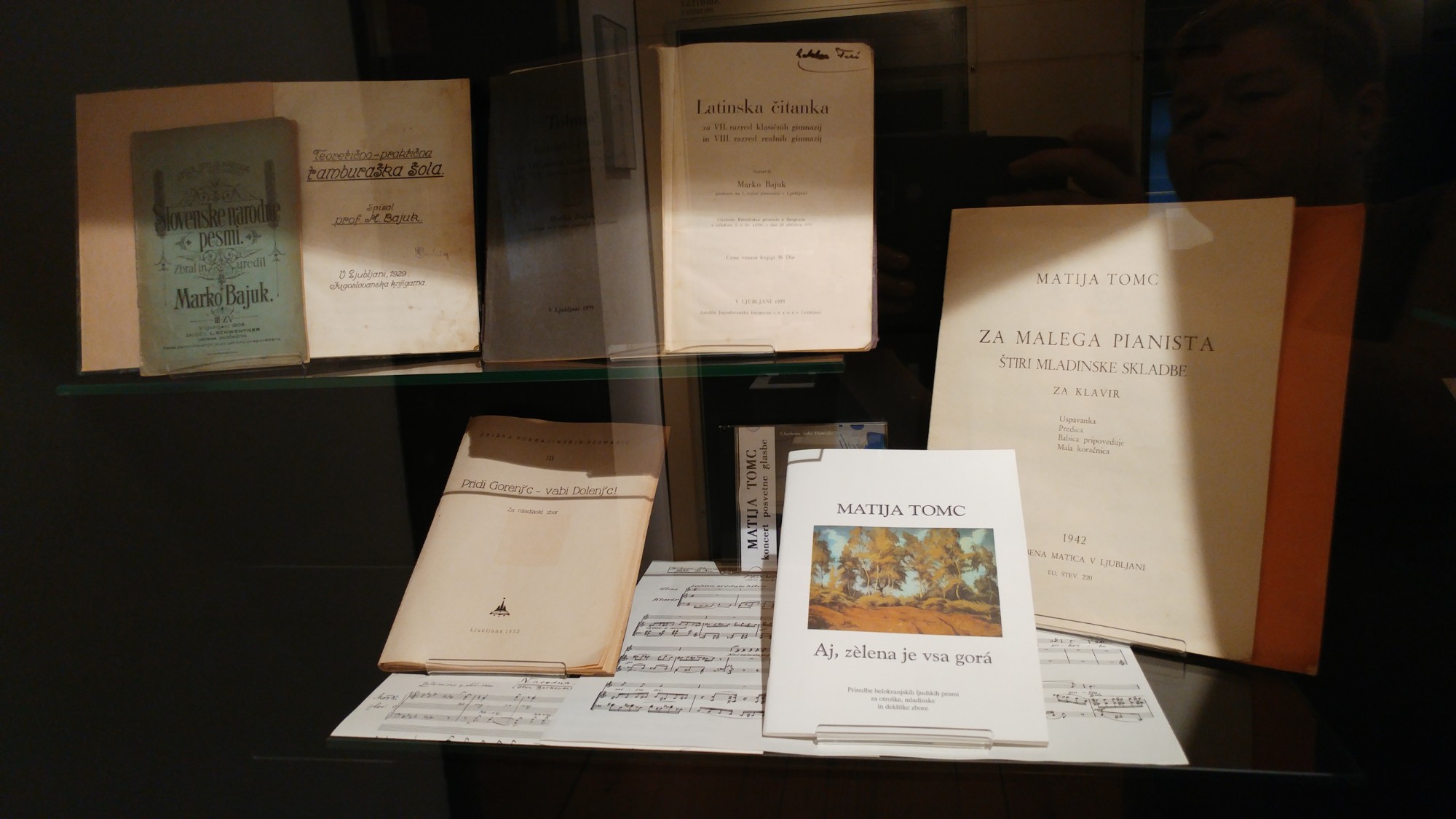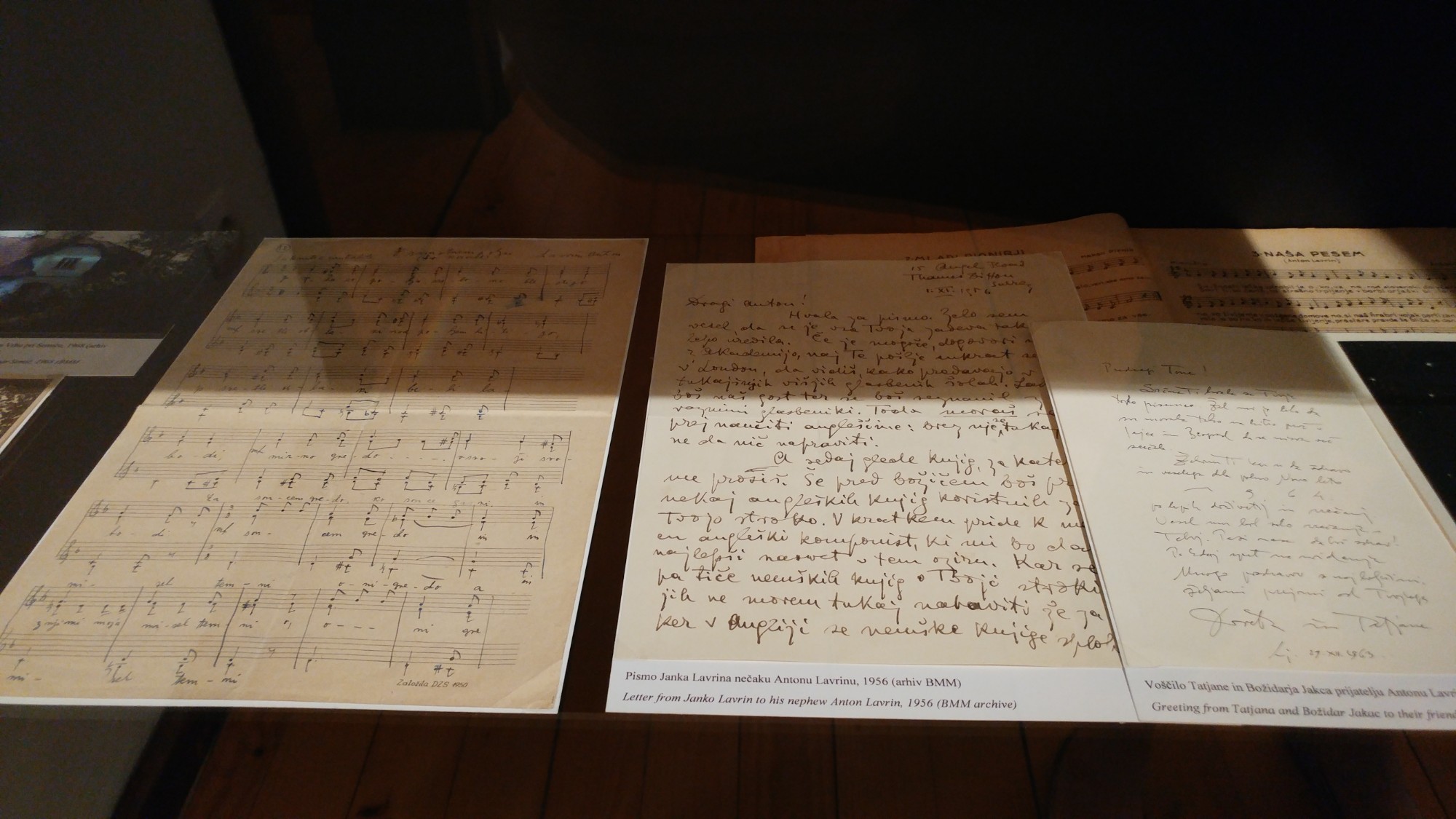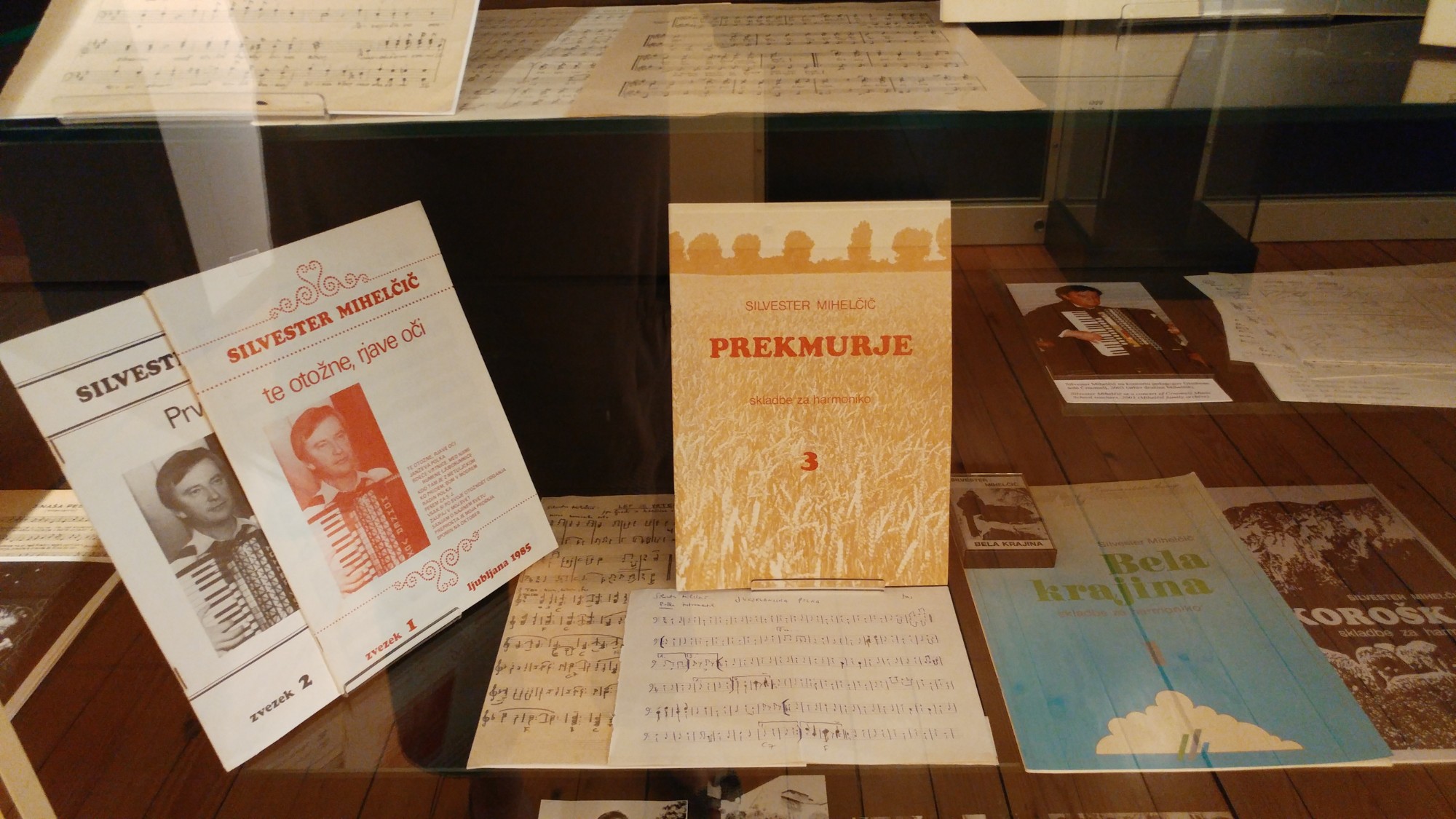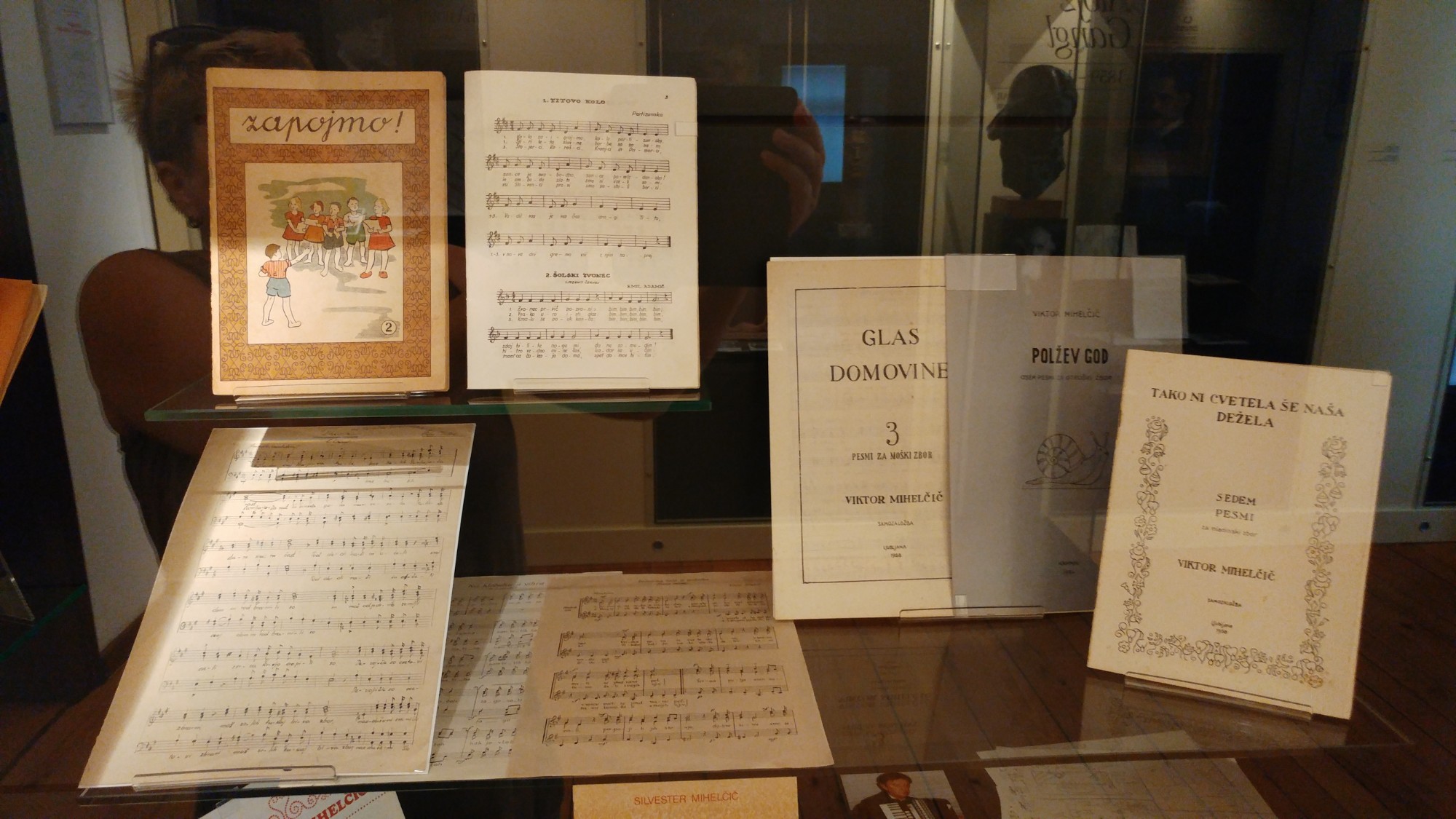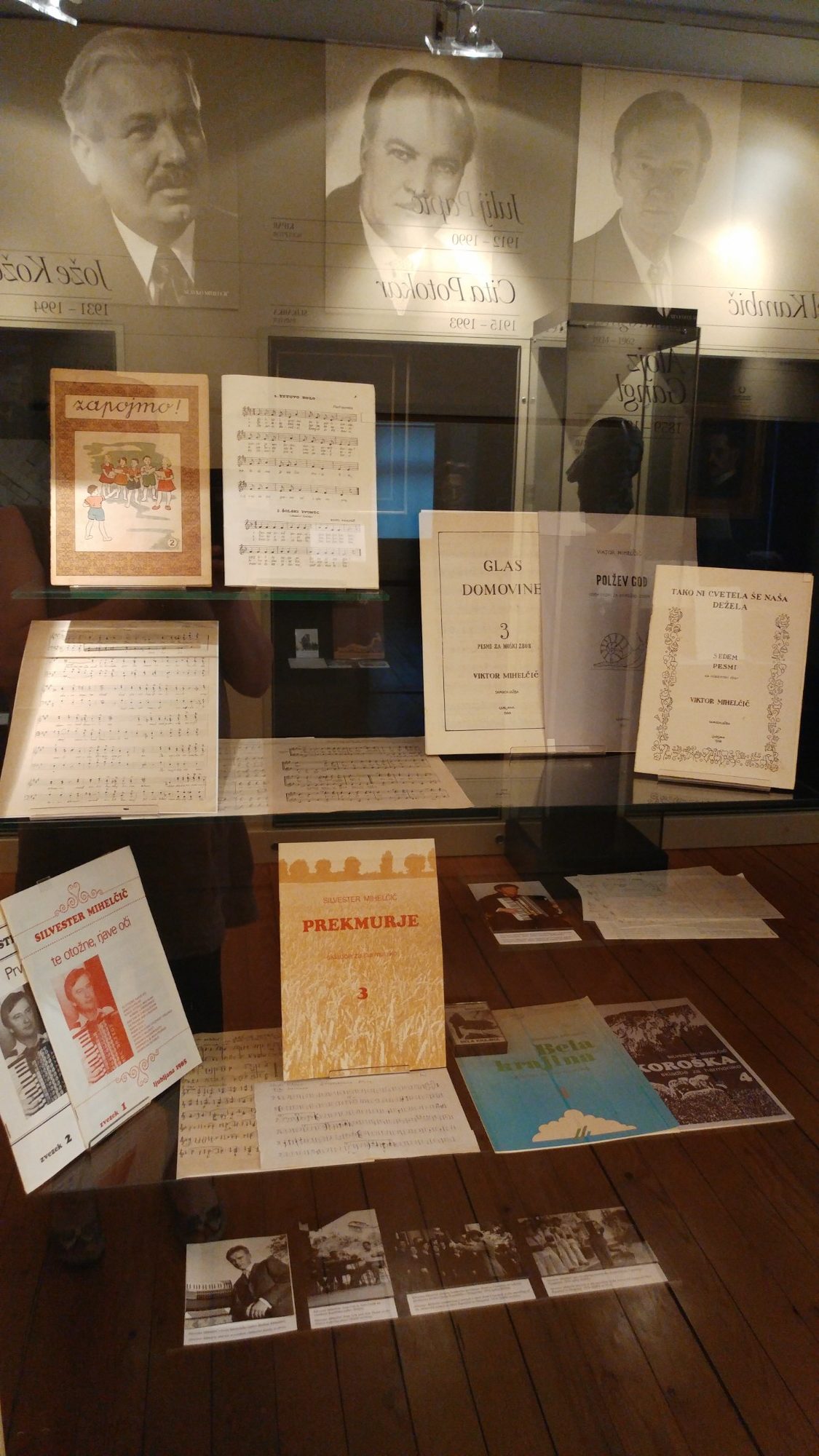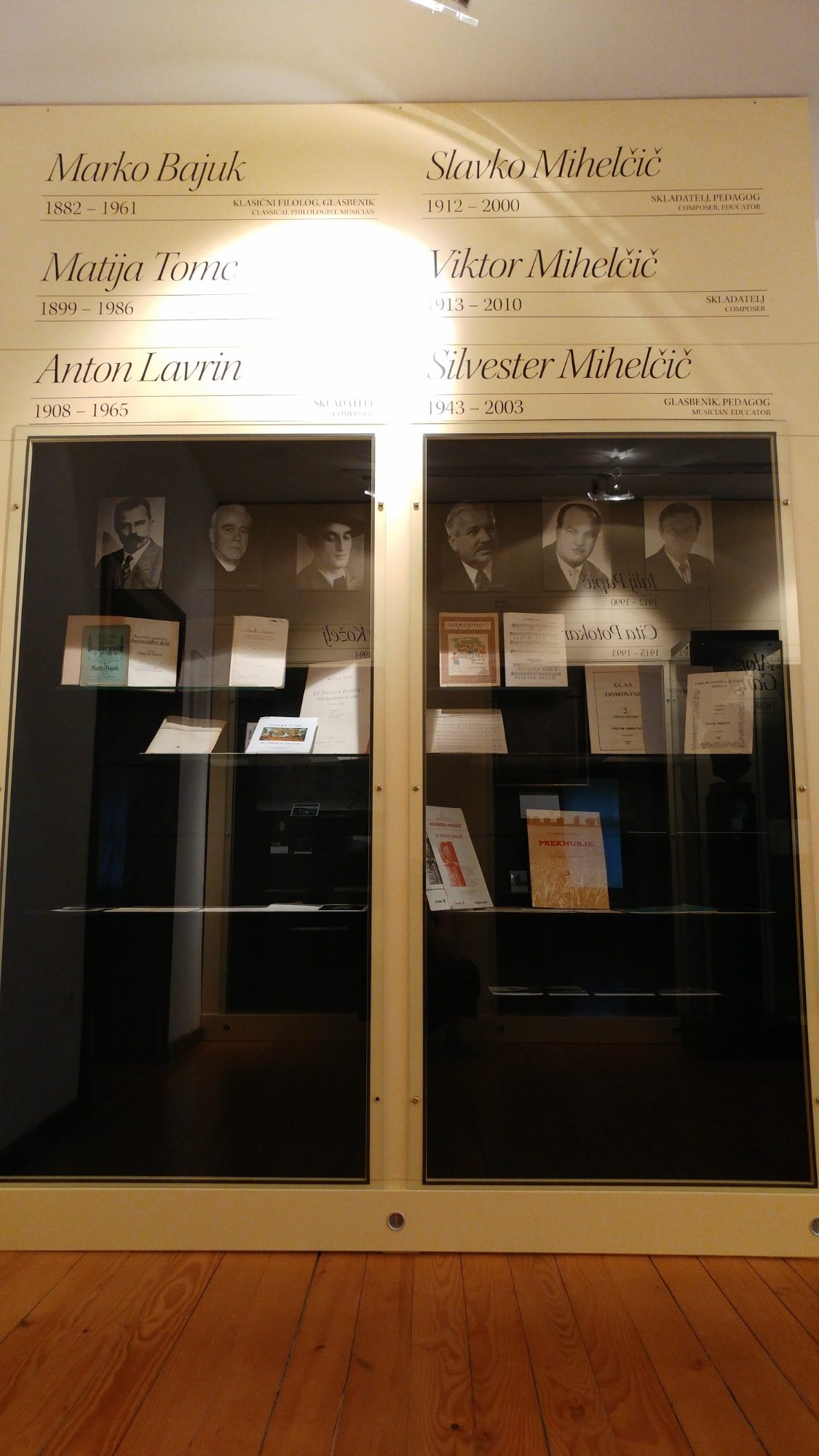The Oton Župančič memorial collection was inaugurated in Vinica in 1951, as part of the formal opening of the Bela Krajina Museum. After renovation works, in 2011, 40 notable personalities of Bela Krajina (White Carniola), were exhibited in four sections and arranged in first-floor rooms by the exhibition curator, Andreja Brancelj Bednaršek, and its designer, Marijan B. Loboda. The green room is assigned to writers, blue to scientists, yellow to musicians, visual and theatre artists, and red to natives of Vinica.
The musicians presented in the museum include Anton Lavrin, Danilo Bučar, Mitja Gregorač, Marko Bajuk, Matija Tomc, and Viktor, Slavko and Silvester Mihelčič. Selected materials of the featured personalities kept in the archives of the Bela Krajina Museum are on view: their works, pictorial material and personal items.
The exhibited artefacts include a manuscript of the composition V samotnem polju (On a Lonely Field) and printed sheet-music of the song Naša pesem (Our Song) by Anton Lavrin, Pevska vadnica (Singing Textbook) by Matija Tomc and his collection of folk-song arrangements titled Aj, zélena je vsa gorá (Hey, Green Is the Mountain), as well as the textbook Pevska šola (Singing Instruction) by Marko Bajuk. The exhibited musical scores by Slavko and Viktor Mihelčič are complemented by a manuscript of Jurjevanjska polka (Jurjevanje Festival Polka) and collections of accordion pieces titled Bela krajina (White Carniola) by Silvester Mihelčič, Danilo Bučar’s sheet-music material and Mitja Gregorač’s pictorial material.
Accompanying the exhibition are video recordings featuring poems about Bela krajina by various authors recited by theatre and film actor Pavle Ravnohrib, and sound recordings of arrangements of Bela Krajina folk songs by accordionist Silvester Mihelčič.
Maia Juvanc
Marko Bajuk
Marko Bajuk (1882–1961) left an important mark on Slovenian singing culture, particularly in the fields of general and music education, choral conducting and scholarly music publications, and is deemed the father of Slovenian folk choral singing among émigrés in Argentina.
He attended elementary school in Metlika, and secondary school in Novo mesto, and graduated from classical grammar school in Ljubljana. He was a boarder at the Alojzijevišče student hostel, a theological seminary in Ljubljana, where he sang in the choir. He developed an interest in music, especially Slovenian folk songs, as a secondary-school student. While attending grammar school, he also received music tutorials from Anton Foerster. After graduation, Bajuk studied classical philology, music, Greek and Latin at the University of Vienna, and took Slovenian and German as additional secondary subjects. As a student in Vienna, he conducted a choir of Viennese Military Guard, into which he incorporated tamboura players. Although he had no formal music education, Bajuk was awarded a professional certificate on the initiative of the Education Section of the Royal Banate Administration and the Glasbena matica Music Society Ljubljana based on his contributions to Slovenian musical life.
He first worked as a teacher of classical philology at Kranj Grammar School, and later at the public grammar school in Ljubljana, where he also taught vocal music and church singing. In Ljubljana, Bajuk set up and conducted the Ljubljana Choral Society. In 1920, he formed the Pevska zveza singing association, acting as its choirmaster and director until 1941. He started the Society of Music Teachers and became its president, established the Teachers’ Choir and launched Pevec, a publication of the Pevska zveza association, to which he contributed for fifteen years. He published several textbooks and secondary-school Latin readers, and edited a number of textbooks for instruction in music and singing.
Bajuk was a first lieutenant in the Austrian army. In 1941, he was mobilised and recruited as a captain in the Yugoslav army. In 1945, he retired to Carinthia, where he organised the system of secondary education and was headmaster of the Slovenian high school in a displaced persons camp in Peggetz near Lienz. Bajuk later left the British allied occupation zone and went to Buenos Aires. After moving to Mendoza, he first worked in a wood company and then in a botanical laboratory. It was also in Argentina that he applied himself to culture and education, among other things co-founding the Slovenian Society.
He published several volumes of folk song arrangements, an extensive study of Slovenian folk song Mera v slovenski narodni pesmi (Measure in Slovenian National Song), as well as a theoretical and practical handbook Pevska šola (Singing Instruction). Besides folk songs, his arrangements for choral ensembles include a good deal of church hymns. Bajuk’s noteworthy Tamburaška šola (Tamboura Handbook) is recognised as the first publication of its kind in Slovenia. Together with Milan Grošelj, Bajuk published commentary editions of works by Sallust (Bellum Iugurthinum), Cicero (Orationes in Catilinam) and Ovid (Izbor iz Ovidovih pesmi – A Selection of Poems by Ovid). Published in Buenos Aires, the Še bomo peli … (We Will Keep Singing…) collection contains Bajuk’s selection of Slovenian folk songs.
Maia Juvanc
Danilo Bučar
Composer and conductor Danilo Bučar (1896–1971) was born in Črnomelj in Bela krajina (White Carniola). He and his family moved to Novo mesto, where his father found employment, and Danilo spent his youth. Young Danilo displayed a natural musical talent, but was compelled to enter the pharmaceutical profession to comply with the wishes of his parents. He continued to pursue his passion as a self-taught musician. He learnt to play several instruments, and secretly took piano lessons with professor Hladnik. After ending his pharmaceutical career, Bučar became editor of the music production of Radio Ljubljana, a position he occupied until 1966.
In Ljubljana, Bučar worked for the Šentjakob (St James) Theatre for a longer spell, composing incidental music for stage performances. This involvement in performing arts encouraged him to start composing. He wrote a play with music and songs Študentje smo (We Are Students), three theatre-music works Na Trški gori (On Trška Gora), Smuk-smuk (Dash-dash) and Kurent, as well as a notable orchestral composition with a lyrical character, a suite in three movements Belokranjske pisanice (White Carniolan Easter Eggs).
Danilo Bučar made an impression on the Slovenian musical landscape primarily with his choral works, most notably Nocoj, pa oh nocoj (Tonight, Oh, Tonight), which was presented before worldwide audiences by the Slovenski oktet (Slovenian Octet).
Maia Juvanc
Mitja Gregorač
Mitja Gregorač was a Slovenian tenor (1923–1997). After graduating from high school, Gregorač studied solo singing in the class of Julij Betetto at the Academy of Music Ljubljana. He held concerts and made recordings in Sarajevo, Maribor and Ljubljana.
The composers who dedicated their works to Gregorač include Uroš Krek, Marjan Lipovšek and Pavel Šivic. He also served as secretary to the Ljubljana Musical Youth. The Slovenian Music Artists’ Association presented Gregorač with the Betetto Award in recognition of his achievements.
Slavko Mihelčič
Slavko Mihelčič (1912–2000) was a composer and choirmaster. He graduated from the Academy of Music in Ljubljana in composition in the class of Slavko Osterc, and in solo singing in the class of Anton Trost. He worked as a teacher in Zagorje ob Savi, Maribor and at the Academy of Education in Ljubljana. Between 1954 and 1963, Mihelčič was principal of the Ljubljana Center Music School.
His extensive music output includes predominantly vocal and vocal-instrumental works, with the addition of instrumental and chamber compositions and an operetta. His most notable compositions are Concertino za klavir in godala, Pentaton za klavir solo in godalni orkester (Concertino for Piano and Strings, Pentatone for Piano Solo and String Orchestra) and two pieces for symphony orchestra Tamarinskaja and Suita iz otrokovega sveta (Suite from a Child’s World). He published several collections of songs for children and youth and wrote numerous compositions for diverse choir formations. Stylistically, the composer is categorised as neoromantic.
Viktor Mihelčič
Slovenian composer Viktor Mihelčič (1913–2010) dedicated himself mostly to vocal music.
In his native Metlika, he first played the flute in the local wind band, and later graduated from organ school in Celje and had private tutorials in counterpoint and harmony with Srečko Koporc. He worked as a choral director and conductor in various places, until he moved to Kamnik in 1938, teaching singing and music at the local grammar school.
WWII did not suspend his musical activities. Thus, in 1944, at the invitation of Bojan Adamič, he joined the newly-formed band of the Headquarters of the National Liberation Army and the Partisan Detachments of Slovenia in Črnomelj. As a member of the partisan forces, he wrote some well-known songs, including Domovina naša je svobodna, Pesem 3. bataljona and Po dolinah in po gorah (Our Homeland Is Free, Song of the 3rd Battalion, Over Valleys and Mountains).
He also composed church music. His Marijine pesmi, Slava Hostiji (Marian Songs, Glory Be to Holy Bread), five holy communion songs for mixed choir and Missa Immaculata for organ and mixed choir, as well as four Lenten songs for mixed choir and organ were published in collections or independently.
He devoted most of his creative energies to composing secular choral works. He wrote over 70 compositions for children’s and youth choirs (a cappella or to piano accompaniment), published in the collections Ringaraja (Merry-go-round, 1968), Polžev rod and Tako ni cvetela še naša dežela (A Family of Snails, Our Land Has Never Flourished So). Some of his songs were published in the music magazine Grlica (Dove) and other publications.
He scored a Metlika march, set to a poem by Engelbert Gangl, and over 100 choral works for different formations. One of his most notable musical settings of poems by France Prešeren is the lied O, Vrba.
Maia Juvanc
Silvester Mihelčič
Silvester Mihelčič (1943–2003) was a music teacher, composer and accordionist. Having completed primary school in Metlika and grammar school in Črnomelj, he studied music and composition in Ljubljana. Mihelčič played an electronic accordion, on which he accompanied opera singers Ladko Korošec, Sonja Hočevar and Rajko Koritnik. For several years, he served as the president of Jeunesses Musicales Slovenia.
He composed pop-folk music, popular and serious music for choir formations, ensembles and orchestras. The bulk of his output is accordion music. He published two volumes of original compositions for accordion, including Te otožne, rjave oči (These Sad Brown Eyes) and Prvi nastop (First Performance). The three volumes titled Bela krajina (White Carniola), Prekmurje and Koroška (Carinthia) comprise his arrangements of folk songs for accordion and are considered some of his finest works. He also wrote the first Slovenian rock opera Maček Muri (Muri the Cat), settings of poems by Kajetan Kovič.
Matija Tomc
You can read the biography HERE.
Anton Lavrin
You can read the biography HERE.
